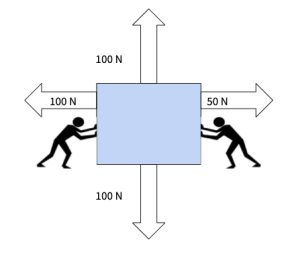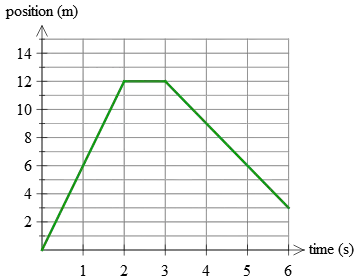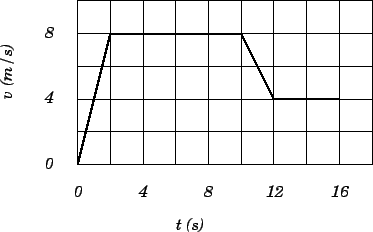A push or a pull that can cause an object to speed up, slow down, or change direction.
What is a force?
This is the term for a place or object used for comparison to determine whether something is in motion.
What is a reference point?
If a runner covers 400 m in 80 seconds, their average speed is this.
What is 5 m/s?
According to Newton’s Second Law, acceleration depends on these two quantities.
What are force and mass?
This type of friction keeps an object from moving when a force is applied.
What is static friction?
The distance an object travels divided by the time it takes is known as this quantity.
What is speed?
The net force of the object shown in the image.

What is 5 N to the left?
An athlete increases speed from 4 m/s to 10 m/s in 3 seconds. What is their acceleration?
What is 2 m/s²?
This law tells us that for every action there is an equal and opposite reaction.
What is Newton’s Third Law?
The type of friction that occurs when an object moves through air or water.
What is fluid friction (drag)?
Mass measures the amount of matter in an object, while this measures the force of gravity on it.
What is weight?
When two equal and opposite forces act on an object and cancel each other out, they are called these.
What are balanced forces?
On a distance–time graph, this feature represents the object’s speed.
What is the slope of the line?
This law states that an object at rest will stay at rest unless acted upon by a nonzero net force.
What is Newton’s First Law (Law of Inertia)?
The gravitational force between two objects depends on these two factors.
What are mass and distance?
This term describes how velocity changes over time.
What is acceleration?
The net force of the object shown in the image.

What is 50 N to the left?
The average speed during the first two seconds of motion.

What is 6 m/s?
If a volleyball experiences a net force of 2 N and accelerates at 8 m/s², its mass is this.
What is 0.25 kg?
If an elephant has a mass of 6,000 kg, its weight on Earth (where g = 9.8 m/s²) is this.
What is 58,800 N?
This type of force acts between two surfaces rubbing together, and always opposes motion.
What is friction?
If the net force on an object is zero, the object’s motion will change in this way.
What is it will not change / remain at rest or move at constant velocity?
The distance covered in 10 seconds.

What is 72 m?
The property of an object that resists changes in motion and increases with mass.
What is inertia?
An object's weight in space, far from any gravitational pull.
What is 0N?